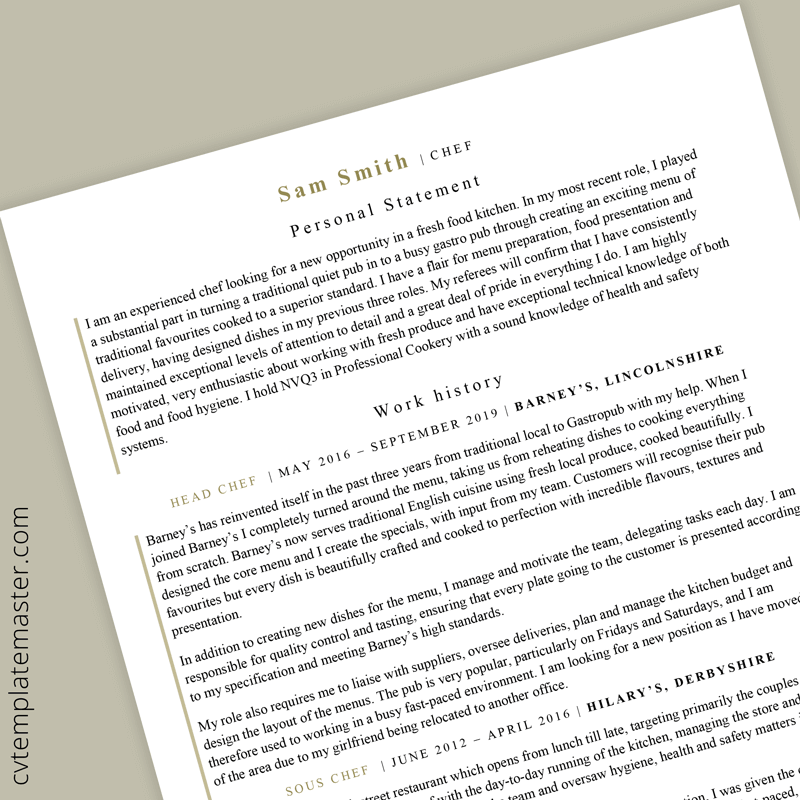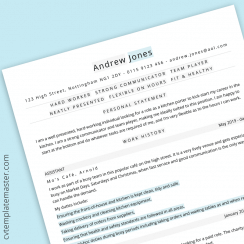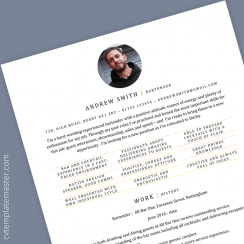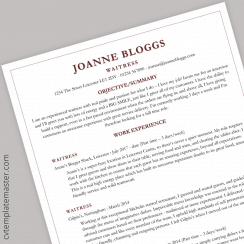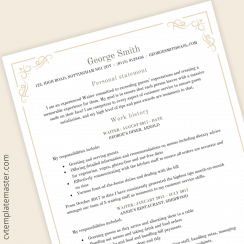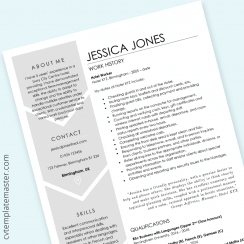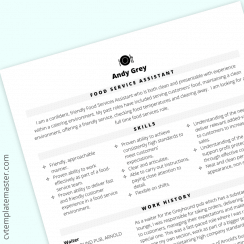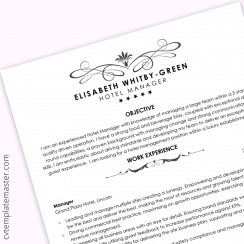Text preview of this CV template:
This is a text-only preview - download the formatted Word file using the link above.
Sam Smith | Chef
3 BISCAY ROAD, LONDON W6 8JW | 020 123 4567
EMAIL: SAMSMITH@AOL.COM | WEB: WWW.SAMSMITHVLOG.COM
TWITTER: @SAMSMITHCOOKS | LINKEDIN: @SAMSMITH37
Personal Statement
I am an experienced chef looking for a new opportunity in a fresh food kitchen. In my most recent role, I played a substantial part in turning a traditional quiet pub in to a busy gastro pub through creating an exciting menu of traditional favourites cooked to a superior standard. I have a flair for menu preparation, food presentation and delivery, having designed dishes in my previous three roles. My referees will confirm that I have consistently maintained exceptional levels of attention to detail and a great deal of pride in everything I do. I am highly motivated, very enthusiastic about working with fresh produce and have exceptional technical knowledge of both food and food hygiene. I hold NVQ3 in Professional Cookery with a sound knowledge of health and safety systems.
Work history
HEAD CHEF | MAY 2016 – SEPTEMBER 2019 | BARNEY’S, LINCOLNSHIRE
Barney’s has reinvented itself in the past three years from traditional local to Gastropub with my help. When I joined Barney’s I completely turned around the menu, taking us from reheating dishes to cooking everything from scratch. Barney’s now serves traditional English cuisine using fresh local produce, cooked beautifully. I designed the core menu and I create the specials, with input from my team. Customers will recognise their pub favourites but every dish is beautifully crafted and cooked to perfection with incredible flavours, textures and presentation.
In addition to creating new dishes for the menu, I manage and motivate the team, delegating tasks each day. I am responsible for quality control and tasting, ensuring that every plate going to the customer is presented according to my specification and meeting Barney’s high standards.
My role also requires me to liaise with suppliers, oversee deliveries, plan and manage the kitchen budget and design the layout of the menus. The pub is very popular, particularly on Fridays and Saturdays, and I am therefore used to working in a busy fast-paced environment. I am looking for a new position as I have moved out of the area due to my girlfriend being relocated to another office.
SOUS CHEF | JUNE 2012 – APRIL 2016 | HILARY’S, DERBYSHIRE
Hilary’s is a small high street restaurant which opens from lunch till late, targeting primarily the couples market. As sous chef I assisted the head chef with the day-to-day running of the kitchen, managing the store and ordering food as required. I trained junior members of the team and oversaw hygiene, health and safety matters in the kitchen.
In addition to preparing and plating food according to the head chef’s specification, I was given the opportunity to create dishes of my own for the specials. Fridays and Saturdays were always full and fast-paced, giving me experience in a busy kitchen.
CHEF DE PARTIE | APRIL 2010 – MAY 2012 | MARC AND DAINA’S, NOTTINGHAM
This small high street restaurant opens in the evening for fine dining. My role here was to prepare, cook and assemble dishes, ensuring they go out on time. I was usually in charge of the fish or meat section of the kitchen as I am very competent in these areas.
In addition, as it was a small restaurant, I was given a lot of input into the menu design. I also supervised more junior staff on busy nights, including the commis chef and assistant.
CHEF | APRIL 2008 – MARCH 2010 | SPIRE BUSHEY HOSPITAL
I was responsible for preparing and cooking meals that are served to staff and patients. For patients, I was required to follow very strict guidelines which tie in with dietary requirements; however, I had the opportunity to showcase my creativity in the staff restaurant.
COMMIS CHEF | AUGUST 2006 – MARCH 2008 | STOP Z, GREATER LONDON
As a junior chef, I learned the fundamentals of cooking in this extremely busy kitchen. This involved both techniques and learning to handle ingredients correctly. I was fortunate to be given the opportunity to work in different sections of the kitchen, helping the Chef de Partie, where I prepared basic food and learned about portion sizes, teamwork and other essentials.
Qualifications
- City and Guilds Level 3 Diploma in Advanced Professional Cookery (7100-85)
- BA in Culinary Arts and Food Business Management (2:1), London Geller College of Hospitality and Tourism
- BTEC Level 2 Home Cooking Skills (Distinction)
- 9 GCSEs grade C and above including Food Technology (C) / Food Preparation and Nutrition (B)
Skills
- Excellent technical skills (cooking techniques, food storage, serving food)
- Excellent understanding of food hygiene, health and safety
- Self-motivated and highly capable of motivating a team with past experience of doing so
- Able to delegate and organise a team
- Exceptional attention to detail, always striving for the highest standards
- Hard-working, flexible, committed and loyal
Interests
In my (limited!) spare time, I love photography and painting. I also visit the gym at least twice a week and like to keep myself fit and healthy.
References
All my previous roles are willing to provide a reference if required.
Template details:
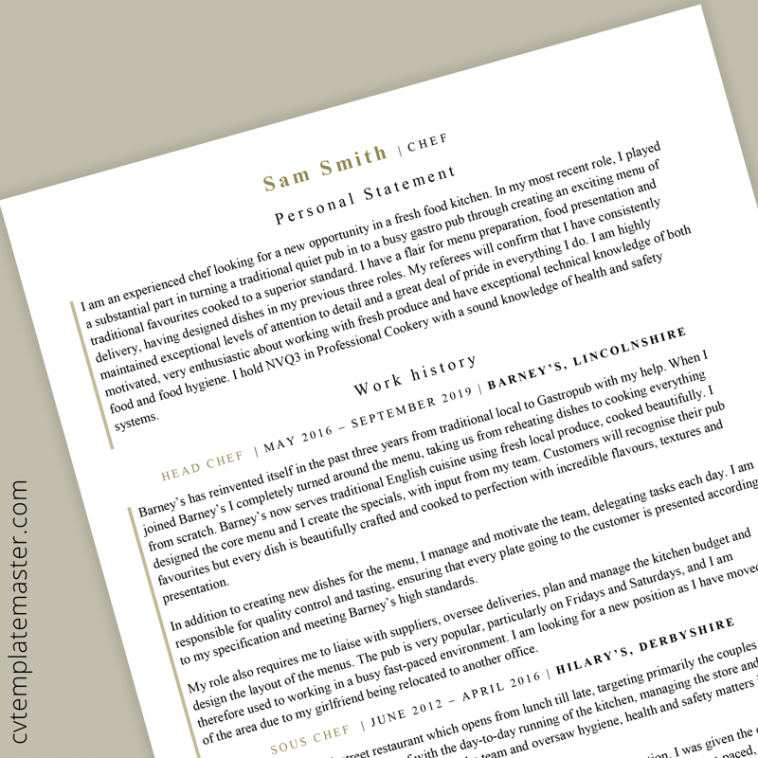
Here’s a full preview of page one of this Chef CV:
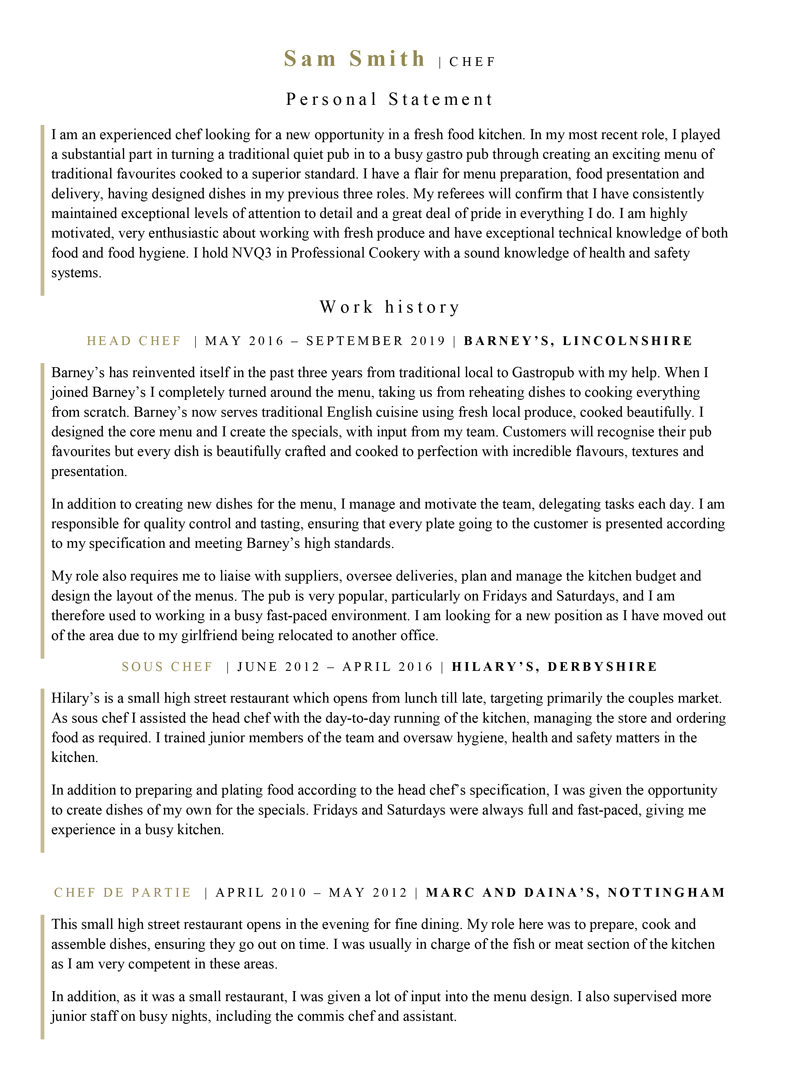
And here’s page two:
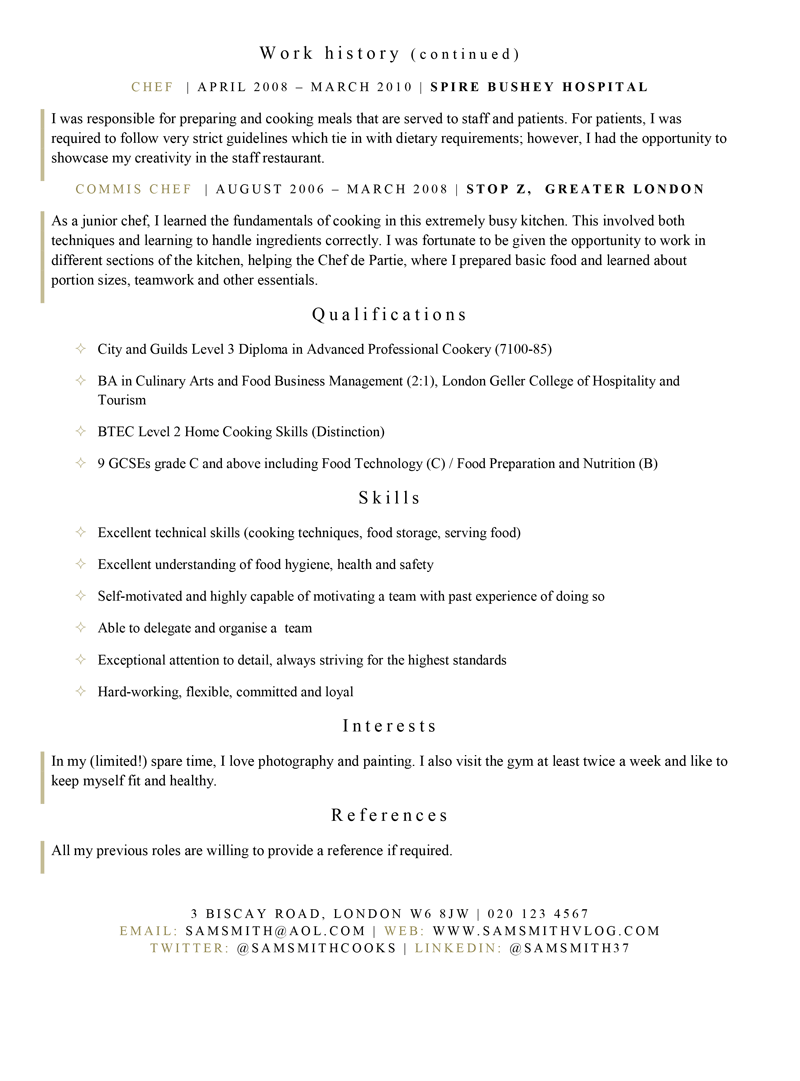
3 tips on how to write the work history for your chef CV
When the employer reads a CV they are interested to see if the candidate has relevant work experience. Some roles would see experience as mandatory, whilst entry level roles would deem this as ‘nice to have, but not too important’.
For chefs, work experience is everything. However, whether you have a small amount of work experience or even decades of employment, there is a right and a wrong way to list the positions. Here are 3 tips on how to write the work history for your chef CV and push you closer to getting a job interview:
1. Gain some experience
Entry level positions will attract a lot of school leavers, and the employer will expect to see quite a few bare CVs when it comes to work experience. Some candidates may have a little, whilst others may have none at all. In this instance they would have to focus heavily on their education when writing a CV but for aspiring chefs, that may be fairly limited.
Some kind of relevant work experience can boost your chances of getting an interview. Places to gain experience include:
- Restaurants: This may be a very junior job initially, but you’ll be around more experienced chefs and learn a lot. If you can’t get a paid junior position, consider volunteering your services. It also helps if you can say you’ve eaten in the venue and you are familiar with their menu.
- Hotels: Some hotels have fine dining restaurants – others only do some combination of breakfast/lunch/room service. In any case, most have a kitchen and a junior position can give you experience and knowledge, working alongside more senior chefs.
- Bakeries: Although bakeries usually look for pastry chefs, they may be willing to take on a junior team member – particularly if you volunteer. This is great experience as you’ll have to follow strict recipes and present your food impeccably, just like a restaurant kitchen.
- Culinary schools: A host of UK culinary schools offer practical tuition that can make up for a lack of paid work experience on your CV. This page has a good selection of links.
- Waiting / Waitressing: Although this experience isn’t directly relevant, it will improve your knowledge of food and get you used to working with the kitchen staff.
- Apprenticeship: Plenty of restaurants in the UK look for apprentices. Pay is typically low, but you’ll get the experience and training you need to advance. This section has lots of opportunities.
- Other voluntary roles: There are always plenty of UK voluntary catering opportunities on offer. These can range from working for charities, through to forming part of a ship’s crew! Although unpaid, this is invaluable experience for your Chef CV. Click here to see some of the opportunities on offer right now.
2. Keep your chef CV relevant
One of the most common mistakes made when writing a chef CV is to list everything, including all or most of the tasks and responsibilities for each past role. Unfortunately this isn’t the format the employer wants to see. Reverse chronological order is the right way to list your work history timeline (most recent role first), but listing all the tasks for everything is not.
The employer is mainly interested in the most recent and relevant roles. Anything else should provide just a small amount of detail allowing the relevant experience to shine through. Review the job advert carefully, together with the employer’s website – and expand upon what would be important to the employer so they can quickly see you have direct relevant work experience. Demonstrate how your past skills are transferable and will be of use to the employer.
The hiring manager will have a hard time trying to read through every single task you’ve completed and will quickly get bored. ‘What use is that to our company?’ is what you’ll likely hear if you were a fly on the wall!
Find out more about tailoring your CV to the role here.
3. Show your performance
Now that you’ve written a relevant work history section you should focus upon your past performances. The employer wants to see two things from your experience. Firstly, the job titles and tasks you’ve covered in the past. This will give them an indication of the skills you’ve potentially learned over the years. The second thing is performance – the employer wants to know how effective you are.
Without any kind of performance indicator you are not going to be able to prove to the employer that you are good at what you do. Listing tasks and responsibilities along with lots of skills doesn’t mean to say you are efficient with those skills. It just means that you were supposed to carry out those duties during your time with a particular company.
The employer will benefit greatly if you provide them lots of examples of your performance – and so will you! This can be anything from revenue to customer service examples; dishes you’ve created, successful projects, menus you’ve designed, advertising campaign results, successful marketing strategies, and so on.
Always backup any of your claims with actual results. This will create a more credible chef CV and boost your chances of gaining a job interview.
4. Avoid employment gaps
The employer wants to see a focused career progression without any gaps in employment. However, if you already have a gap there is something you can do about it. Firstly, let’s take a look at how to avoid an employment gap to ensure you don’t give an employer cause for concern.
If you find yourself out of work with the potential for a lengthy spell away, you need to take action before it damages your CV. Sometimes it may be hard to know how long it may take to find another job. But that doesn’t mean to say you shouldn’t make plans. If you are confident that your credentials will get you quickly back into work, then you should be fine. However, if the clock begins to tick and you are struggling to get a job offer, you could consider a few options:
- Voluntary work
- Education – online course or college
- Part time work
As noted above, voluntary work is a great way to keep busy and continue to develop your chef skills. The employer will be pleased that you kept busy in between your usual career, and helping others with your free time will also give you a few brownie points. Voluntary work is readily available and is often flexible around your current situation. It will allow you to continue to search for full time employment and easily attend any interviews on the horizon.
Going back to school may be a good option if you know you will be out of work for a long amount of time. There are some great online catering courses which allow you to study from the convenience of your own home, and there are also catering college courses to consider. This could be a great way to bolster your qualifications and show a potential employer that you took advantage of your circumstances.
The bottom line is that you need to keep busy and plug a gap in your employment. Something needs to go onto your CV for any lengthy periods out of work. The employer wants to see that you’ve taken the initiative.
If you already have an employment gap then you should still look to fill it. Try to be honest and transparent as to why you were out of work for a long time. The employer would rather you put something down that leave it for them to guess. They will obviously become suspicious and could make assumptions that you just struggled to get hired. This would ring alarm bells and make them wonder if you are not a hireable person. Maybe you always struggle at the interview stage, or something else that is preventing you from getting hired.
You can also consider using your personal statement or cover letter to describe why you were out of work. Personal health issues, looking after a family member, a gap year or anything else can be better explained in a letter or statement. It will instantly quash any negative thoughts the employer may have and allow them to focus on your skills and achievements instead.
